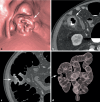[Imaging of colorectal cancer: Role of computed tomography colonography]
- PMID: 40392342
- PMCID: PMC12106516
- DOI: 10.1007/s00117-025-01456-8
[Imaging of colorectal cancer: Role of computed tomography colonography]
Abstract
Background: Computed tomography colonography (CTC) is a minimally invasive examination for radiologic imaging of the entire colon and rectum. It has replaced the now obsolete barium enemas and represents an important option to colonoscopy for the detection of colorectal neoplasia.
Objectives: The aim of this article is to review the current status of CTC for detection of colorectal cancer (CRC) and its precursors.
Materials and methods: Based on an extensive literature research, the current role of CTC in colorectal cancer imaging is summarized. This includes not only CRC detection but also the role of CTC in CRC screening and surveillance.
Results: CTC is a well-developed, minimally invasive examination for the identification of colorectal neoplasia. The diagnostic accuracy for colorectal adenomas and cancer is comparable to that of optical colonoscopy. Missed CRC cases are rare and typically result from perceptual or technical errors. In addition to the detection and characterization of carcinomas, CTC enables the visualization of prestenotic colonic segments and extracolonic structures. This allows for the preoperative detection of synchronous colonic neoplasms that are not endoscopically assessable as well as evaluation of abdominal tumor spread. Due to its ability to detect benign precancerous adenomas with high sensitivity, CTC can be used for opportunistic colorectal cancer screening. In CRC follow-up, CTC may be used to diagnose recurrence if colonoscopy is incomplete or not feasible.
Conclusion: CTC is the radiological examination of choice for the detection of colorectal neoplasia. It is typically used in patients where colonoscopy is incomplete, contraindicated or refused. Moreover, CTC serves as a noninvasive option for opportunistic colorectal cancer screening.
Zusammenfassung: HINTERGRUND: Die Computertomographie-Kolonographie (CTK) ist eine minimal-invasive radiologische Untersuchung zur Darstellung des gesamten Kolons und Rektums. Sie ersetzt den mittlerweile obsoleten Kolonkontrasteinlauf und stellt eine wichtige Ergänzung zur Koloskopie in der Dickdarmkrebsdiagnostik dar.
Ziel der arbeit: Ziel dieser Arbeit ist es, einen Überblick über den aktuellen Stellenwert und den Nutzen der CTK zur minimal-invasiven bildgebenden Diagnostik kolorektaler Karzinome (KRK) zu bieten.
Material und methoden: Mittels einer ausführlichen Literaturrecherche wird der aktuelle Wissensstand zur Rolle der CTK in der Dickdarmkrebsdiagnostik zusammengefasst. Dies umfasst neben der Bildgebung manifester Karzinome auch den Einsatz der CTK in der Vor- und Nachsorge des KRK.
Ergebnisse: Die CTK ist eine ausgereifte, minimal-invasive Untersuchung zur Abklärung kolorektaler Neoplasien. Die Detektionsrate für gutartige Krebsvorstufen und manifeste Karzinome ist vergleichbar mit der Detektionsrate der optischen Koloskopie. Fehldiagnosen bei KRK sind selten und meist durch Perzeptionsfehler und technische Fehler bedingt. Durch die Möglichkeit bei stenosierenden Karzinomen auch endoskopisch nicht einsehbare Darmabschnitte und extrakolische Strukturen darzustellen, können zusätzlich zur Tumordetektion auch synchrone Dickdarmneoplasien erkannt und die abdominale Tumorausbreitung beurteilt werden. Neben der Diagnose manifester Karzinome kann die CTK durch das rechtzeitige Erkennen benigner Krebsvorstufen zur Dickdarmkrebsvorsorge eingesetzt werden. In der KRK-Nachsorge kann die CTK bei nicht erfolgreicher Koloskopie alternativ zur Rezidivdiagnostik eingesetzt werden.
Diskussion: Die CT-Kolonographie ist die radiologische Untersuchung der Wahl zur Detektion kolorektaler Neoplasien. Sie kommt meistens bei Personen zum Einsatz, bei denen eine Koloskopie nicht möglich oder nur unvollständig ist, kann aber auch zur opportunistischen Dickdarmkrebsvorsorge eingesetzt werden.
Keywords: CT colonography; Colorectal adenoma; Colorectal neoplasia; Detection rate; Follow-up; Screening; Surveillance.
© 2025. The Author(s).
Conflict of interest statement
Einhaltung ethischer Richtlinien. Interessenkonflikt: T. Mang, N. Bogveradze, M. Bergman, S. Leitner und M. Scharitzer geben an, dass kein Interessenkonflikt besteht. Für diesen Beitrag wurden von den Autor/-innen keine Studien an Menschen oder Tieren durchgeführt. Für die aufgeführten Studien gelten die jeweils dort angegebenen ethischen Richtlinien.
Figures









Similar articles
-
An international review of the main cost-effectiveness drivers of virtual colonography versus conventional colonoscopy for colorectal cancer screening: is the tide changing due to adherence?Eur J Radiol. 2013 Nov;82(11):e629-36. doi: 10.1016/j.ejrad.2013.07.019. Epub 2013 Aug 12. Eur J Radiol. 2013. PMID: 23938237
-
Utility of CT colonography and/or PET-CT preoperatively in obstructing left-sided colorectal cancers - a systematic review.ANZ J Surg. 2023 Jun;93(6):1487-1494. doi: 10.1111/ans.18450. Epub 2023 Apr 6. ANZ J Surg. 2023. PMID: 37025031
-
The potential of CT colonography for colorectal cancer screening in Japan.Jpn J Radiol. 2025 Sep;43(9):1417-1426. doi: 10.1007/s11604-025-01798-2. Epub 2025 May 10. Jpn J Radiol. 2025. PMID: 40347404 Free PMC article. Review.
-
Sensitivity and specificity of CT colonography for the detection of colonic neoplasia after positive faecal occult blood testing: systematic review and meta-analysis.Eur Radiol. 2014 May;24(5):1049-58. doi: 10.1007/s00330-014-3106-0. Epub 2014 Feb 12. Eur Radiol. 2014. PMID: 24519111
-
What is the value of computered tomography colonography in patients screening positive for fecal occult blood? A systematic review and economic evaluation.Clin Gastroenterol Hepatol. 2007 Dec;5(12):1439-46; quiz 1368. doi: 10.1016/j.cgh.2007.09.003. Clin Gastroenterol Hepatol. 2007. PMID: 18054752
References
-
- Spada C, Hassan C, Bellini D et al (2021) Imaging alternatives to colonoscopy: CT colonography and colon capsule. European Society of Gastrointestinal Endoscopy (ESGE) and European Society of Gastrointestinal and Abdominal Radiology (ESGAR) Guideline – Update 2020. Eur Radiol 31:2967–2982 - PubMed
-
- American College of Radiology (2019) ACR-SAR-SCBT-MR Practice Parameter for the Performance of CT Colonography in Adults. In: ACR practice guideline 2014. American College of Radiology,
-
- Yee J, Dachman A, Kim DH et al (2024) CT Colonography Reporting and Data System (C-RADS): Version 2023 Update. Radiology 310:e232007 - PubMed
Publication types
MeSH terms
LinkOut - more resources
Full Text Sources
Medical
